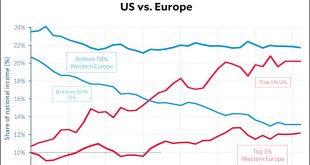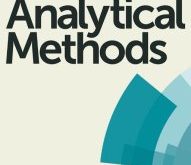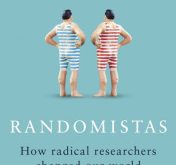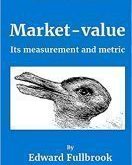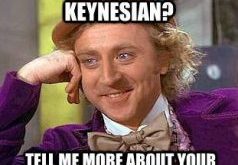from Norbert Häring The OECD and the EU want to change international tax principles to curb tax evasion. The United States is opposed to the plans as they would affect its internet companies and other US multinationals. The US has stepped up its fight against taxes on digital corporations. Shortly after President Donald Trump’s threat of special tariffs on French goods, US Treasury Secretary Steven Mnuchin asked all countries in early December to abandon similar plans for taxes that would...
Read More »Growth of Income Inequality: US vs. Europe
Source: World Inequality Database
Read More »What went wrong with economics?
from Lars Syll To be ‘analytical’ is something most people find recommendable. The word ‘analytical’ has a positive connotation. Scientists think deeper than most other people because they use ‘analytical’ methods. In dictionaries, ‘analysis’ is usually defined as having to do with “breaking something down.” But that’s not the whole picture. As used in science, analysis usually means something more specific. It means to separate a problem into its constituent elements so to reduce complex...
Read More »Errors of empiricism 4
from Asad Zaman Empiricism holds that observations are all that we have. We cannot penetrate through the observations to the hidden reality which generates these observations. Here is a picture which illustrates the empiricist view of the world: The wild and complex reality generates signals which we observe using our five senses. The aspects of reality which we can observe are the only things that we can know about reality. The true nature of hidden reality, as it really is, independent...
Read More »The randomistas revolution
from Lars Syll In his history of experimental social science — Randomistas: How radical researchers are changing our world (Yale University Press, 2018) — Andrew Leigh gives an introduction to the RCT (randomized controlled trial) method for conducting experiments in medicine, psychology, development economics, and policy evaluation. Although it mentions there are critiques that can be waged against it, the author does not let that shadow his overwhelmingly enthusiastic view on RCT. Among...
Read More »2019 was “one of the strongest in the history of financial markets.” What does that mean?
from Edward Fullbrook Here is a passage from an article that appeared last week in The Guardian. With one day of trading to go, 2019 is on course to be one of the strongest in the history of financial markets after shares around the world racked up record after record in another barnstorming year. On Wall Street the Dow Jones industrial average has gone up almost 25% having reached record highs day after day, while the broader S&P500 is up 30% and the tech-heavy Nasdaq has grown 40%...
Read More »The productivity of bullshit jobs
from Blair Fix I recently read David Graeber’s book Bullshit Jobs: A Theory. If you’re not familiar, David Graeber is the anthropologist who wrote Debt: The First 5000 Years, a seminal book on the history of money and credit. In Bullshit Jobs, Graeber takes aim at pointless work. Graeber describes a bullshit job as: a form of paid employment that is so completely pointless, unnecessary, or pernicious that even the employee cannot justify its existence even though, as part of the...
Read More »Free college and pay-by-the-mile auto insurance
from Dean Baker Recently, Washington Post columnist Catherine Rampell reported on the negative reactions of college presidents to the idea of free public college. The context was a media dinner with a dozen college presidents, most of whom were leading non-flagship public schools, according to Rampell. The presidents were asked if they thought it was likely that the government would adopt free college along the lines proposed by presidential candidates Senators Bernie Sanders and...
Read More »‘New Keynesianism’ — the art of making relevance irrelevant
from Lars Syll There really is something about the way macroeconomists construct their models nowadays that obviously doesn’t sit right. Empirical evidence still only plays a minor role in mainstream economic theory, where models largely function as a substitute for empirical evidence. One might have hoped that humbled by the manifest failure of its theoretical pretences during the latest economic-financial crises, the one-sided, almost religious, insistence on axiomatic-deductivist...
Read More »Thinking about Thinking 3
from Asad Zaman When we think about epistemology (theory of knowledge), then we are doing meta-thinking. That is, we are thinking about thoughts people have, which they think is “knowledge”. Because there are many many wrong ideas, and very few right ideas, we must learn to think critically. Unless we do so, our thoughts will be captured by the enormous amounts of fake news which circulates on social media these days. Thinking about thinking, or Meta-Thought, is very different from the...
Read More » Real-World Economics Review
Real-World Economics Review

